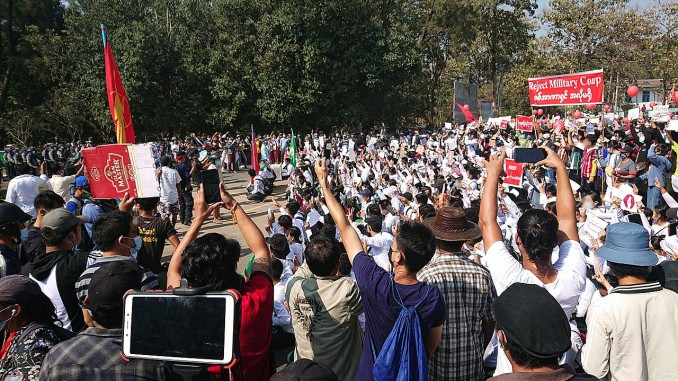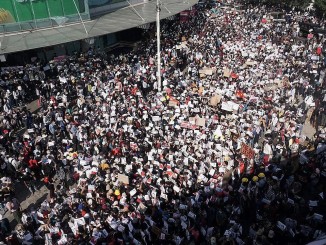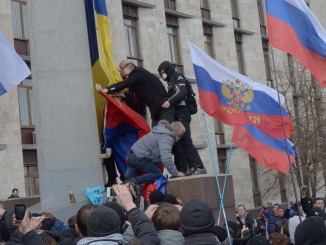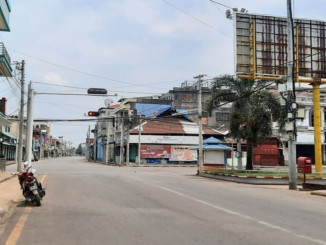
Last month, the military of the South Asian country of Myanmar seized control of the government in a military coup. The head of state, Aung San Suu Kyi, was arrested along with officials of her party, the National League for Democracy, which had ruled the country since being elected in 2016 and again in 2020.
This conflict is the latest episode in a long long struggle against military power in Myanmar. Myanmar, previously known as Burma, was colonized and exploited by the British starting in the 19th century. After World War II, Britain could no longer afford to hold onto its empire, and Burma gained independence. This left the native Burmese elite in charge. From 1948 to 1962, Burma saw a series of social struggles by poor and working people that threatened to overturn the elitist regime. It is at this point that the military seized power in 1962. The military stepped in to settle the conflict between rich and poor – and became the ruling power in the country itself. The military has ruled ever since, either openly, or from behind the scenes when it is forced to. It was under military rule, in 1989, that the name of the country was changed from Burma to Myanmar.
The military held control of Myanmar in part by stoking the prejudice of the Buddhist majority in Burma against religious and ethnic minorities. For example, in 1982 the military declared the Rohingya, a Muslim minority, to be illegal immigrants from Bangladesh. This began a campaign of ethnic cleansing. The oppression of the Rohingya is only one of the worst examples. The military has engaged in a struggle against the Cachin, Karen, and Kokand people, all distinct minorities with their own cultural and religious practices.
The military regime in Myanmar has historically relied on support from China. China’s strategy is to keep Myanmar as a close ally for military and strategic reasons. For this reason China’s chief competitor, the United States, has chosen to support opposition to the military regime and put pressure and sanctions on it via the United Nations.
In the last 58 years, the military has been forced to loosen its grip twice. From 1988 to 1990 and again after 2016 until the present coup. During this time, Aung San Suu Kyi came to prominence as head of the opposition party, the National League for Democracy. Suu Kyi is the daughter of Aung San, a historic leader of Burmese resistance to British colonialism, and a former official in the Burmese government before the military coup. Aung San Suu Kyi grew up in exile, receiving an education in India and Britain, and working for the United Nations.
In 1988, when a massive struggle against the dictatorship burst out in Myanmar, Aung San Suu Kyi returned and became a leader in the opposition within the country. In 1990, the movement won the right to an election, and Aung San Suu Kyi was elected at the head of her party, the National League for Democracy. This result was too much for the military and they overturned the results and violently seized power again.
In the following decades pressure from the United States and other countries via the United Nations on the military, led to a carefully-managed election in 2016. The military would allow Aung San Suu Kyi to be elected and hold office, in return for greater investment from the West, and weaker ties to China. Aung San Suu Kyi was elected state counselor, the equivalent of president. She ruled the country for five years and was elected again in 2020, prompting the military coup. Even during Aung San Suu Kyi’s time as state counselor, it was clear that the military had a great deal of power. Aung San Suu Kyi defended the ongoing ethnic cleansing carried out by the military against the Rohingya. She used the same nationalist language used by the military.
In the midst of the economic and social crisis generated by COVID-19, the military seems to have decided that this election would be the last for Aung San Suu Kyi, and the military would take direct control again. What are they afraid of? They are afraid of exactly what is happening as a consequence of their coup. Hundreds of thousands of protesters have poured into the streets to oppose the seizure of power by the military. Strikes against the government and the coup are taking place in workplaces around the country. Thousands of Burmese workers and youth are refusing to let the military return to power. Like in 1988, the population of Myanmar has risen up against the military. This time, the movement has the potential to go beyond the compromise with the military made by Aung San Suu Kyi and her opposition, who are really just salesmen for U.S. influence, willing to compromise with the genocidal military government.




